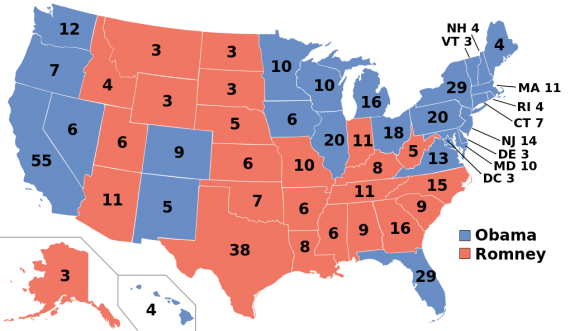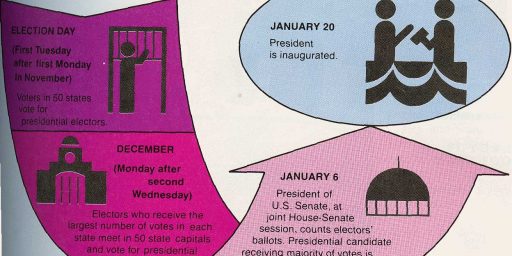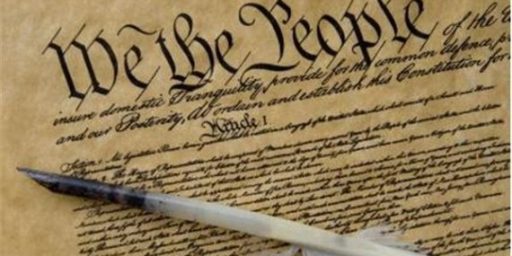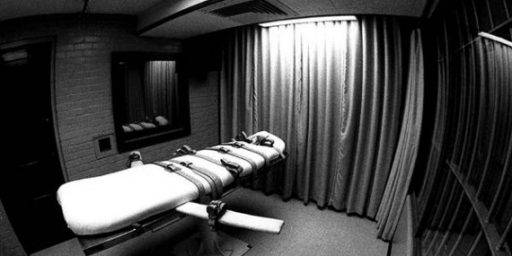Nebraska To Abandon Congressional District Method For Electoral Votes?
Nebraska legislators are talking about abandoning their somewhat unique method of allocating Electoral College votes.
Along with Maine, Nebraska is unique in the manner in which it allocates its Electoral Votes. Instead of a winner take all allocation in which the person who gets the most votes gets all of the state’s electoral votes, in Nebraska a candidate has the opportunity to win one, two or three Electoral Votes if they manage to get a majority of the vote in any one of the state’s three Congressional Districts, with the remaining two votes going to the candidate who wins the state overall. For the most part, this distinction, which is also the manner in which Maine allocates its Electoral Votes, has not mattered very much since its generally always been the case that the candidate who wins the state overall also ends up winning in each of the Congressional Districts. The one exception to that rule came in 2008 when President Obama managed to snag a single Electoral Vote in the state thanks to a concentration of resources on the state’s Second Congressional District and managed to eke out a narrow win there even though it lost the state as a whole to John McCain by nearly 100,000 votes. Between Maine and Nebraska, this is the only time that such a split in Electoral College votes has happened in modern political history.
Now, legislators in Nebraska are considering scrapping the District Method of Electoral Vote allocation and returning to the Winner Take All system that was in place in the state before 1991:
A bill looks set to pass the state legislature as soon as Tuesday that would make Nebraska a winner-takes-all state by the next presidential election. Its passage is not a given, but there’s a good possibility.
That would mean that never again — or at least not in the foreseeable future — could a Democrat hope to take an electoral vote out of Nebraska as Barack Obama did in 2008 when he won the Omaha-based 2nd Congressional District.
(…)
Nebraska’s state lawmakers decided to move to its current system in 1991. Supporters said it would make Nebraska more relevant on the national stage because suddenly at least one or two of its electoral votes would be in play. Presidential candidates would actually come to Nebraska to campaign, they said. They based their model on Maine’s, which has been used in that state since 1972.
The planned competitiveness of Nebraska never really panned out. All five of Nebraska’s electoral votes went for the Republican presidential candidate from 1992 until 2008. That year, Obama’s campaign set up a ground game in Omaha, dispatching hundreds of field workers to the district and eventually winning it by just more than 3,000 votes.
One of the bill’s most vocal proponents, state Sen.Beau McCoy, says Nebraska should speak with a unified voice, especially since a split electoral system doesn’t make much sense if Nebraska is one of the only states to do it. ”To me, it’s a matter of fairness,” McCoy told the Omaha World-Herald. “It’s not partisan politics.”
Political observers such as the University of Nebraska’s Kevin Smith think there’s also a clear correlation between Obama winning an electoral vote in the state in 2008 and the Republican-led effort to stop letting congressional districts have a say in the state’s electoral vote allocation. Why keep a system that benefits Democrats even a little bit when Republicans have the power to change it back?
“I think if Obama had failed to take that electoral vote and all the electoral college delegates from Nebraska went to the Republican, I don’t think they’d be having this debate right now,” Smith said.
But reverting to a winner-takes-all system has eluded Nebraska Republicans, who for all intents and purposes control the nonpartisan state legislature and all levers of the state government. This will be at least the 15th time Republicans have tried to change it back to a winner-takes-all system. Last year, they got close, falling just two votes shy of breaking a filibuster.
On some level, the desire on the part of some legislators in Nebraska to end the experiment with the District Method is completely understandable. When they adopted the change in the early 90s, the hope was that the change would make the Cornhusker State, which has gone Republican in the vast majority of Presidential elections since it was admitted to the Union in 1867, more relevant to Presidential elections. With the exception of the 2008 Obama campaign, though, which decided to make the place for the Second Congressional District largely because it had the resources, and a comfortable enough national lead, to do so, though, it has seldom been the case that the state has received any more attention from Presidential candidates than it would have otherwise. Even the single Electoral Vote that Obama won in 2008 seemed like it was mostly something the campaign did for bragging rights since it obviously did not have any real impact on the outcome of the race. Given that, and given the fact that it now seems unlikely that any other states are going to join Nebraska and Maine in using the District Method to allocate their Electoral Votes, the desire to return to the old Winner Take All system is understandable.
In the past, I have been sympathetic to the idea of a nationwide switch to the District Method based on the argument that it would make the outcome in the Electoral College more closely match the popular vote as well as give candidates an incentive to pay attention to states that they now basically write off because the Winner Take All method means that the state is essentially non-competitive for one party or the other. More recently, though, I’ve changed my mind on that issue given the fact that the way that Congressional Districts are drawn in most states means that it would be more likely that the candidate with the most Electoral Votes would be someone other than the candidate who won the popular vote. For example, if the District Method had been used nationwide in 2012, Mitt Romney would have won the election despite losing the popular vote. While this has happened before in American history, it’s a less than ideal outcome and one that ought to be avoided if possible. If the Electoral College is to be reformed, a more ideal change would be one in which Electoral Votes are allocated on a purely proportional basis, which each candidate getting a share of a state’s Electoral College votes based on their percentage of the Popular Vote in that state. Under this method, it’s much less likely that we would have an outcome where the minority candidate wins the election, and the only real impact would be that the allocation of Electoral College votes would more closely match the popular vote. If this method had been effect in 2012, for example, Barack Obama still would have won the election, but his margin of victory in the Electoral College would have been 282-255, an allocation that would much more closely match the popular vote outcome that year. Among other things, this proportional system would potentially encourage candidates to run a more nationwide campaign for President rather than one that concentrates on a handful of swing states as we are likely to see again in 2016.
As for Nebraska, whether they abandon the District Method or not is their choice. They’ve tried to do so before only to see the effort die in the legislature. With a Presidential election just around the corner, though, this may be the time that the effort succeeds. On some level, though, it’s unfortunate if it does happen since it will likely mean the end of any real discussions about reforming the Electoral College in a manner that makes sense.
Update (April 13, 2016) : Late yesterday, Nebraska’s unicameral legislature rejected the bill to return to a Winner Take All allocation.







Talents for low intrigue, and the little arts of popularity, may alone suffice to elevate a man to the first honors in a single State; but it will require other talents, and a different kind of merit, to establish him in the esteem and confidence of the whole Union, or of so considerable a portion of it as would be necessary to make him a successful candidate for the distinguished office of President of the United States.
-Federalist 68
_____________
The president is supposed to represent the people and the states, which is why the number of electors is equal to the number of Congressional representatives (with the modern exception of DC.) The small states would be easy to ignore without an electoral college that gave them a seat at the table.
We made a deal with those smaller states in order to get the Constitution ratified, and we ought to stick to that deal just for the sake of principle, even if we don’t always like the outcome. The same conditions that led to the creation of the electoral college still exist today, i.e. some states are a lot larger than others and states continue to have their own interests.
The GOP thinks that awarding electoral votes by congressional district is a bad idea in red states but that it’s a really good idea in blue/purple states where the governor is a republican.
I’m baffled by the idea that invariably voting for the same party makes those votes “irrelevant”. That’s like saying that the fact that you eat dinner every day makes each evening’s food irrelevant. It may be less satisfying (or exciting) than food you get when you aren’t sure you’re going to get any at all, but it’s surely still relevant.
Nebraska’s change or non change is a back eddie in the current of politics right now. We are watching the splintering of the GOP which, I’ve said for a long time, is inevitable. Victims of their own success, the falsehood of total control of determining what individual values are acceptable in our modern world has so isolated religious conservatives that they are blind to new realities. Where once, a delegate or two, either locally, primarily, or at the presidential level, might matter, now any GOP presidential contender is going to be overwhelmed by the electoral college.
It’s only natural for such consistent losers to want to change the system, despite their self described fervent 1st American century traditionalism. Rather than embrace the changes needed to remain socially acceptable, they have cannabalized their own. Case in point: Phyllis Shafley totally drops her moral indignation to liscentious behavior. Where once she gutted Rockefeller to give the election kiss of death to goldwater, she now kneels at Trump’s feet. so shocking is this that her people are tossing her under the bus to choose a real “conservative”. Cruz.
One loose electoral vote or ten, or twenty even, will not save the GOP from itself. Conservatism is past its apex and we are seeing the roiling waters of the coming liberal paradigm
Um, never mind. OWH reports it failed in the Unicameral by one vote. This is the 15th attempt over 25 years to get rid of the Congressional District Method, so nothing new.
@DrDaveT: The argument is that, since it’s winner-take-all, there’s not much point in campaigning in or even paying attention to states that are a lock for one party. Three of our most populous states—California, New York, and Texas—are essentially irrelevant to the campaign because they’re baked into the system. Florida and Ohio, by contrast, get disproportionate attention.
In a system where every vote is simply one vote for a national candidate, by contrast, the residency of the voters would be irrelevant. Getting one extra vote in California or DC or Utah would count just as much.
@James Joyner: In a proportional system, the most probable outcome would be that candidates flood rural areas with TV ads and do campaign events on large metropolitan areas. In some sense, that would change the game, but that would not mean that every vote would be equal. Some votes would be more expensive than others.
@RGardner:
Every vote counts! Ah, delicious irony….
@KM: Indeed.
@James Joyner:
Of course. But that makes Nebraska irrelevant when deciding where to spend campaign dollars. I had naively assumed that “mak[ing] Nebraska more relevant on the national stage” had something to do with having a larger role in deciding who will be President. If you’re right, and it’s just about whether you attract a minor influx of out-of-state cash or a VERY minor influx of out-of-state cash every four years, that’s pathetic.
(If it’s about wanting more warm fuzzies from your own Party, that’s even more pathetic.)
@Rocco delafield:
Well put. I would add the falsehood of believing they could forever con the rubes into voting for the economic interests of the .01%.